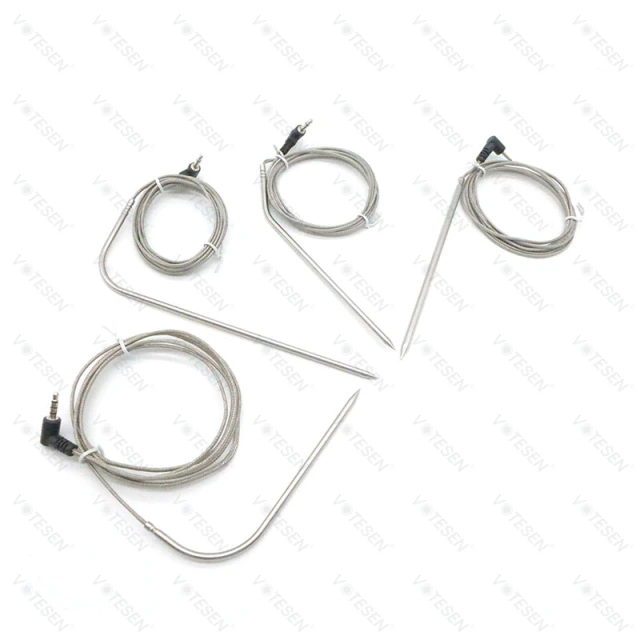Ensuring Food Safety with High Precision PT100 Temperature Sensors
Table of contents:
How PT100 Probes Help Maintain HACCP Compliance in Food Storage
The Role of PT100 Sensors in Preventing Foodborne Illnesses
Implementing PT100 Temperature Monitoring Systems in Restaurant Kitchens
Choosing the Right PT100 Sensor Supplier for Your Food Safety Needs
How PT100 Probes Help Maintain HACCP Compliance in Food Storage
Hazard Analysis and Critical Control Points (HACCP) is a systematic approach to food safety that relies heavily on temperature control. PT100 temperature sensors play a vital role in helping businesses adhere to HACCP guidelines by providing precise temperature readings in food storage areas. These sensors, sourced from trusted temperature sensor manufacturers, can be strategically placed in refrigerators, freezers, and storage rooms to continuously monitor and record temperatures. This constant vigilance ensures that food items are stored at safe temperatures, preventing bacterial growth and spoilage. By integrating PT100 sensors into their HACCP plans, food businesses can demonstrate due diligence in maintaining food safety standards and easily provide accurate temperature logs during inspections.
The Role of PT100 Sensors in Preventing Foodborne Illnesses
Foodborne illnesses pose a significant threat to public health, and maintaining proper food temperatures is crucial in preventing their occurrence. PT100 temperature sensors are invaluable tools in this fight against food-related diseases. These sensors, available from reputable temperature sensor suppliers, offer exceptional accuracy across a wide temperature range, from -40°C to +450°C. This broad range allows for monitoring temperatures in various food preparation processes, from cooking and cooling to reheating. The high precision of PT100 sensors ensures that food reaches and maintains safe temperatures, effectively killing harmful bacteria and pathogens. By implementing these sensors in their operations, food service establishments can significantly reduce the risk of serving contaminated food and protect their customers' health.
Implementing PT100 Temperature Monitoring Systems in Restaurant Kitchens
Modern restaurant kitchens are fast-paced environments where temperature control is paramount. Implementing PT100 temperature monitoring systems can streamline operations while enhancing food safety. These systems, featuring sensors from leading temperature sensor manufacturers, can be integrated into various kitchen equipment, including ovens, grills, and refrigeration units. The real-time temperature data provided by PT100 sensors allows kitchen staff to monitor and adjust cooking temperatures precisely, ensuring consistent food quality and safety. Additionally, automated temperature logging systems can save time and reduce human error in record-keeping. Restaurant owners looking to upgrade their temperature monitoring capabilities should consult with a knowledgeable temperature sensor supplier to design a system tailored to their specific needs.
Choosing the Right PT100 Sensor Supplier for Your Food Safety Needs
Selecting the appropriate PT100 temperature sensors for food safety applications requires careful consideration and expert guidance. When seeking a temperature sensor supplier, it's essential to choose one with extensive experience in the food industry. Look for suppliers who offer a range of PT100 sensor configurations, including probes with food-grade stainless steel construction and heat-resistant wiring. The ability to customize sensors for specific applications, such as BBQ needle probes or bent probes for hard-to-reach areas, is also valuable. Additionally, consider temperature sensor manufacturers that provide comprehensive support, including calibration services and technical assistance. By partnering with a reputable supplier, food businesses can ensure they have access to high-quality PT100 sensors that meet their specific food safety requirements and industry standards.
Temperature control is the cornerstone of food safety, and PT100 temperature sensors are at the forefront of this critical aspect of the food industry. These high-precision devices offer unparalleled accuracy and reliability, making them essential tools for businesses committed to maintaining the highest food safety standards. From ensuring HACCP compliance to preventing foodborne illnesses, PT100 sensors play a crucial role in every stage of food handling and preparation. As the importance of precise temperature monitoring continues to grow, partnering with trusted temperature sensor manufacturers and suppliers becomes increasingly vital. By investing in quality PT100 sensors and implementing comprehensive temperature monitoring systems, food businesses can protect their customers, enhance their reputation, and stay ahead in an industry where safety and quality are paramount.

Comments
Post a Comment